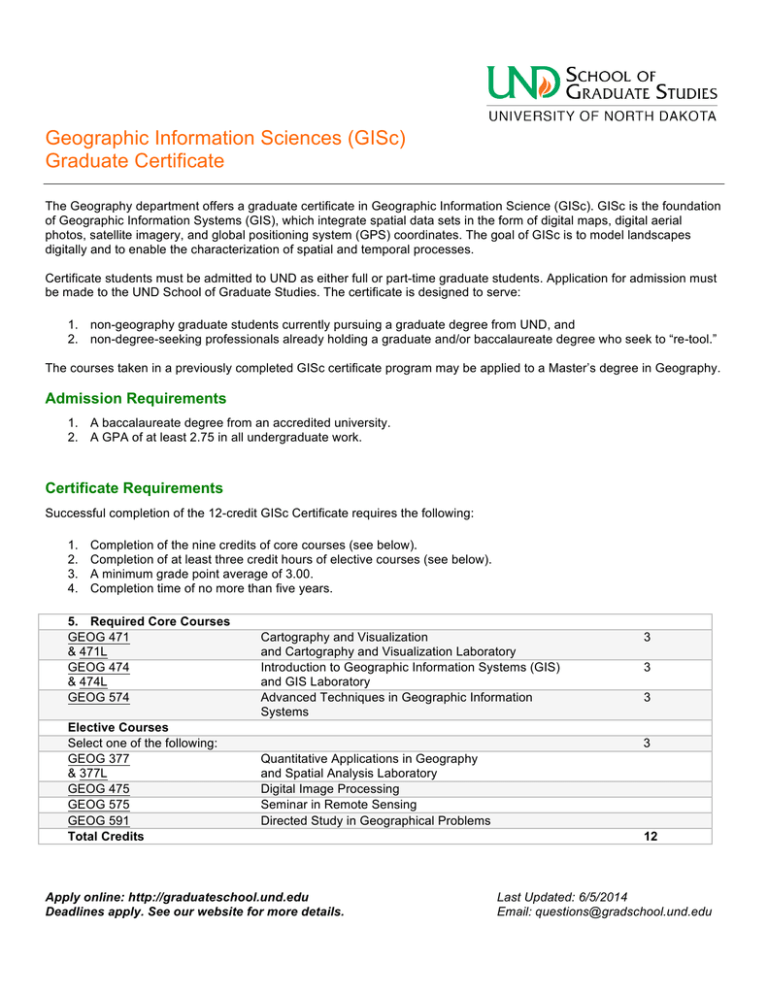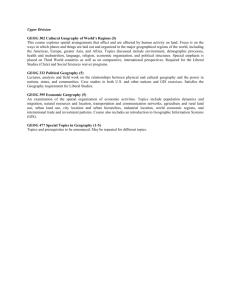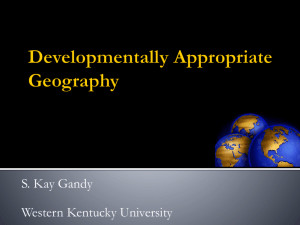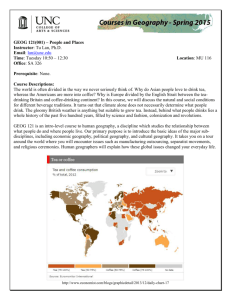Geographic Information Sciences (GISc) Graduate Certificate
advertisement

Geographic Information Sciences (GISc) Graduate Certificate The Geography department offers a graduate certificate in Geographic Information Science (GISc). GISc is the foundation of Geographic Information Systems (GIS), which integrate spatial data sets in the form of digital maps, digital aerial photos, satellite imagery, and global positioning system (GPS) coordinates. The goal of GISc is to model landscapes digitally and to enable the characterization of spatial and temporal processes. Certificate students must be admitted to UND as either full or part-time graduate students. Application for admission must be made to the UND School of Graduate Studies. The certificate is designed to serve: 1. non-geography graduate students currently pursuing a graduate degree from UND, and 2. non-degree-seeking professionals already holding a graduate and/or baccalaureate degree who seek to “re-tool.” The courses taken in a previously completed GISc certificate program may be applied to a Master’s degree in Geography. Admission Requirements 1. A baccalaureate degree from an accredited university. 2. A GPA of at least 2.75 in all undergraduate work. Certificate Requirements Successful completion of the 12-credit GISc Certificate requires the following: 1. 2. 3. 4. Completion of the nine credits of core courses (see below). Completion of at least three credit hours of elective courses (see below). A minimum grade point average of 3.00. Completion time of no more than five years. 5. Required Core Courses GEOG 471 & 471L GEOG 474 & 474L GEOG 574 Elective Courses Select one of the following: GEOG 377 & 377L GEOG 475 GEOG 575 GEOG 591 Total Credits Cartography and Visualization and Cartography and Visualization Laboratory Introduction to Geographic Information Systems (GIS) and GIS Laboratory Advanced Techniques in Geographic Information Systems 3 3 3 3 Quantitative Applications in Geography and Spatial Analysis Laboratory Digital Image Processing Seminar in Remote Sensing Directed Study in Geographical Problems 12 Apply online: http://graduateschool.und.edu Deadlines apply. See our website for more details. Last Updated: 6/5/2014 Email: questions@gradschool.und.edu Faculty and Areas of Expertise • • • • • • • • Christopher Atkinson, Ph.D., historical climatology of blizzards, climate/climate change, hazards, North America Devon A. Hansen, Ph.D., migration, population, gender issues, community development, Great Plains Douglas C. Munski, Ph.D., historical, geographic education, tourism, Canada, North America Michael A. Niedzielski, Ph.D., commutes, land use, and policy; rail transit, world cities, and sustainability; the impact of socio-economic factors on segregation indices Bradley C. Rundquist, Ph.D., Chair, remote sensing, digital image processing, geographic information systems, biogeography Paul E. Todhunter, Ph.D., climatology, hydrology, natural hazards, human impacts Gregory S. Vandeberg, PhD, fluvial and glacial geomorphology, heavy metals in the environment, disturbed land reclamation, geographic information systems, remote sensing Enru Wang, Ph.D., economic, regional development, urban, China, GIS Contact Information Dr. Enru Wang, Graduate Program Director Department of Geography University of North Dakota 221 Centennial Drive, Stop 9020 Grand Forks, ND 58202-9020 P: 701-777-4590 F: 701-777-6195 http://arts-sciences.und.edu/geography/ E: enru.wang@und.edu Dr Brad Rundquist, Chair Department of Geography University of North Dakota 221 Centennial Drive, Stop 9020 Grand Forks, ND 58202-9020 P: 701 777-4246 F: 701-777-6195 E: bradley.rundquist@und.edu The Department of Geography also offers an MS and an MA degree in Geography. Apply online: http://graduateschool.und.edu Deadlines apply. See our website for more details. Last Updated: 6/5/2014 Email: questions@gradschool.und.edu






